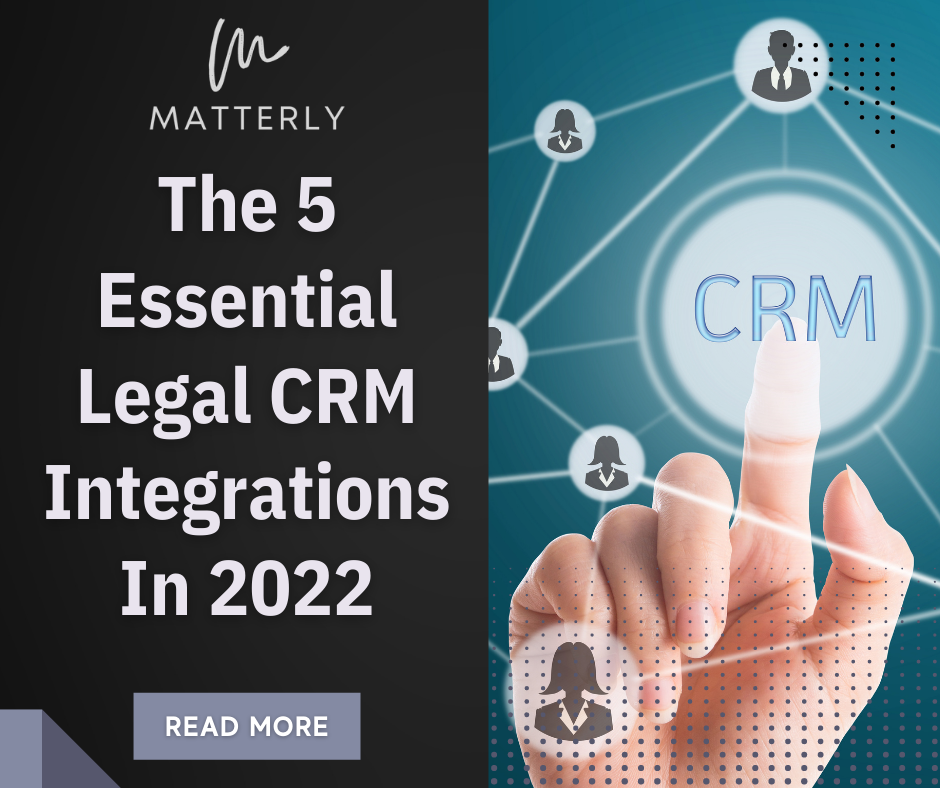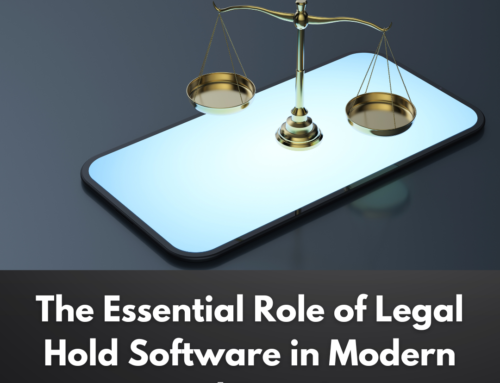Every law firm by now has accepted that they need a legal CRM in 2022. But what are the most important Legal CRM integrations for your firm?
Before delving into that, we will break down exactly what Legal CRM software is.
Legal CRM Software:
Customer relationship management (CRM) is a system for managing all of your company’s relationships and interactions with present and potential customers.
The goal is simple: to strengthen economic connections. A CRM system helps organizations stay connected to their consumers while reducing operations and enhancing profitability.
CRM is commonly used to refer to a CRM system, which is a tool that supports contact management, sales management, productivity, and other areas.
Legal CRM integrations enable your firm to focus on individual individuals — such as customers, service users, colleagues, or suppliers — throughout the relationship’s lifespan, including discovering new customers, gaining their business, and providing support and extra services.
LEGAL CLIENT RELATIONSHIP MANAGEMENT (CRM) SOFTWARE:
Legal client relationship management (CRM) software, assists law firms in administering business development activities such as client intake, scheduling and follow-up, revenue tracking, and more.
Legal CRM software automates turning prospective new clients into retained clients.
Customer relationship management is a discipline that combines methods and technologies to manage customer interactions effectively.
It is based on gathering and analyzing data from client contact points across the “customer life cycle.” This cycle might comprise anything from prospect and lead contact through post-sale contacts and subscriber or customer retention initiatives.
On the other hand, CRM software is a centralized platform that consolidates a range of customer-related data into a single database or group of databases for faster, more streamlined access and analysis.
Customers may be more easily handled by compiling and storing client bio details, account information, sales data, corporate records, etc. Some CRM systems are single-purchase software programmes placed on a corporate server and provide the organization with complete control over the programme and data.
Other systems operate as software as a service (SaaS) platforms, which a company may subscribe to and use from anywhere. There are other open-source solutions.
CRM systems automate the collection, storage, and organization of customer data. Automation enhances the client experience and the business by lowering the workload.
That also aids adaptation to or interaction with other unique systems inside the firm, which is likely the most significant benefit of CRM systems. Do your consumers supply an email address while purchasing one programme, but another software handles email marketing? CRM software may fill this need.
Who Is A Legal CRM Designed For?
A CRM system helps everyone manage the external relationships and connections that drive success, whether in sales, customer service, business development, recruiting, marketing, or any other company sector.
A CRM platform helps you to save contact information for customers and prospects, uncover sales opportunities, track service issues, and manage marketing campaigns all in one place – and make information about every client encounter available to everyone in your company who needs it.
5 Key Legal CRM Benefits
Increased Revenue with Lower Overhead Increase income or cutting expenses is the two strategies to improve a company’s financial situation. CRM solutions can assist you in both scenarios.
Most significantly, a CRM system may assist in shortening sales cycles and increasing win rates. That is accomplished by assisting in discovering and prioritizing the most profitable accounts and marketing initiatives.
You may reduce wasted effort by focusing sales and marketing teams on customers with the highest profit potential. A secondary advantage of account identification is identifying non-profitable or difficult clients who require special treatment.
Certain legal CRM integreations may also help you save money on overhead. The CRM may give a consolidated perspective into all revenue-affecting information by linking with other financial systems, decreasing the effort necessary to access relevant data.
Furthermore, by automating routine operations, the system decreases the number of manual procedures and the amount of time spent on them.
- Customer Satisfaction
A satisfied customer is a loyal customer, and a CRM may assist in improving a customer’s entire experience with your firm. Sales, marketing, customer service, and other departments that have direct contact with customers might exchange account information.
As a result, all stakeholders are kept informed when a client is transferred from marketing to sales and subsequently to support.
By recording a customer’s past, the CRM may also give insight into the customer’s anticipated future demands.
Knowing if a client likes to buy a specific product or has a recurring service demand allows your staff to be better prepared for future requests.
- Marketing Optimization
Making marketing efforts effective is one of the most difficult challenges. CRMs may assess previous campaigns and clients to assist you in tailoring future marketing to be more lucrative and successful.
Responses to automated campaigns, such as email or social media marketing, may be assessed automatically by the CRM and then sent to sales employees, allowing sales to focus on the best possible prospects.
- Collaboration and coordination strengthened.
Interdepartmental coordination is frequently a problem, especially in a fast-paced sales cycle.
A Customer Relationship Management system, particularly one that is mobile or cloud-based, can improve cooperation across the sales cycle. Shared calendars, customer information, and work items enable visibility into current initiatives throughout the firm.
Increased coordination and collaboration improve team efficiency, lowers unnecessary work, and decrease missed opportunities caused by a lack of communication.
The shared data may also assist in identifying which team members or departments are the greatest performers, allowing you to more easily learn what they are doing that could benefit the rest of the teams.
- Data Insight and Analytics Have Improved
If you can’t access it, all the data in the world is meaningless. CRMs deliver ready-to-use visuals and reports on your customer data.
The system allows you to examine sales and customer trends and gain insight into the sales funnel and the success of marketing initiatives.
Potential resource constraints can be discovered before they become a problem.
WHAT ARE LEGAL CRM INTEGRATIONS
Integrating a CRM system with other systems is known as “CRM integration,” and it simply implies that a company’s customer data may be smoothly merged with third-party systems.
Although these third-party systems are independent of the CRM system, the data they create or utilize can help CRM perform better and vice versa.
Customer data continues to be one of the most significant resources a business can have.
A corporation can give individualized attention and better strategize marketing by better knowing existing and future clients. However, recording, collecting, and maintaining all of this.
Data is a daunting process.
Businesses frequently rely on integrated customer relationship management (CRM) solutions to consolidate other systems, databases, and information streams.
How CRM Integration Works
For many sorts of firms, the integration will appear very different.
For some, it’s as simple as connecting a CRM system to a few functionalities of a corporate website, which may be accomplished using interfaces built into CRM software.
On the other hand, more complicated firms will require the integration of a CRM platform with a range of other systems, including those that are equally or more complex, such as an ERP (enterprise resource planning) system.
Most CRM system connections necessitate APIs (application programming interfaces).
For implementing CRM connections, a solution is known as “integration platform as a service” simplifies information exchange across third-party systems has become prevalent.
If you’re getting to know your CRM software and are thrilled with how well it works on its own, let us introduce you to your new favourite feature: integrations.
While CRM software is effective, connecting it with additional tools in your sales stack makes your work much simpler.
Ideally, your CRM should serve as the key hub for all of your sales activity, with integrations acting as the supporting cast, enhancing the strength of your central software.
Have you ever been annoyed when going through time-consuming processes that require switching between numerous systems?
Are you ready to increase the functionality of your CRM and have it integrate directly with the other products and systems you use now that you’ve deployed it?
If you responded yes to these questions, it’s time to integrate CRM. Here are some of the key CRM integrations you will need;
- Contact administration
It is a key element of any professional CRM system. However, it should be more than just a beautiful address book; it should allow you to track all client interactions from the first point of contact through the customer journey (including data!).
Great contact management also enables you to set up lead scoring, which may help you anticipate how likely a prospect is to convert into a paying client over time.
- Integration of social media
Social selling is no longer a trendy term. People like to buy from people they know, like, and trust. Social networking may help you stay top of mind while establishing relationships with future consumers.
Your CRM software may help with this by importing your contacts’ social network accounts (e.g., Twitter, Facebook, LinkedIn, etc.) to mention them in your messages
without leaving your CRM. Furthermore, many CRMs allow you to submit and schedule changes and respond to comments right from your dashboard.
- Automation of email
This tool allows you to prepare, automate, deliver, and track email campaigns without leaving your CRM dashboard, whether you want to batch sales emails, book more sales calls, plan your weekly newsletter, or send a welcome “drip” campaign.
These emails can also be linked to new and existing processes.
- Automation and management of workflows
Creating comprehensive workflows may assist in increasing sales teams in scaling systems and procedures while maintaining quality.
For example, when you send out an automated email campaign, you can link it to a process that directs all responses to a certain sales team.
Alternatively, if a visitor clicks a certain link or visits a specified landing page, you may add them to a new “drip” email campaign.
- Customization
It might be not easy to transition from one CRM program to another.
It would help if you had faith in your CRM software’s ability to function and grow with your team and organization as they grow.
One critical element is the ability to tailor it to your unique business and consumer requirements. It might range from unique procedures to the addition of plug-ins and customized reports.
- Storage and management of documents
A good legal CRM integrations may serve as your organization’s “single source of truth,” allowing you to maintain all records in one place that everyone can view.
According to the International Data Corporation, knowledge workers spend an average of 2.5 hours a day searching for information.
Creating processes to save all vital documents in your legal CRM integrations may significantly boost productivity and eliminate most firms’ clutter.
LEGAL CRM INTEGRATION’S ADVANTAGES
At its finest, Legal CRM integrations inside a firm functions similarly to the expediter in a restaurant kitchen, connecting the customer-facing side of operations to the “back of house” where services are created.
In both situations, a smooth and predictable flow of information between these many pieces keeps the whole picture functioning smoothly and, ultimately, consumers pleased.
Here are a few main advantages to adopting CRM integration for this purpose.
- Improved Communication and Customer Service
The quality of the experience your consumers have while doing business with you is just as essential as the quality of the items or services.
It is especially evident in industries where several rivals offer identical products and services. Businesses cannot afford to drop the ball on any important communication to keep consumers pleased and stay ahead of their competitors and must make timely, accurate, and customized contact when reaching out.
CRM integration’s access to information, automation capability, and potential to enhance staff knowledge has proven useful to many firms’ customer-facing components.
CRM may assist give the best chance of achieving sales development by acquiring and maintaining customers through effective communication.
- Automation Possibilities
Any platform that allows for the automation of communication and record-keeping duties has the potential to help a business save resources, as these are two areas that would otherwise consume a significant amount of staff time.
A well-integrated CRM system, for example, can connect incoming information regarding customer assistance requirements to a system that automates appropriate communication to the customer and relevant business partners.
Legal CRM integrations save time and money since there is no need to engage someone to oversee the process or keep manual records of everything once it’s accomplished.
- Organization and efficiency have improved.
As crucial as automation is for internal efficiency, consolidating information into a single system provides for enhanced production.
When staff don’t have to log in to and flip back and forth between numerous systems, and when needed information can be acquired and changed instantaneously, tasks like monitoring and analyzing client data may be done more easily and at a larger scale.
Centralized access to structured data reduces an employee’s burden and encourages openness and straightforward communication within the organization.
FINAL THOUGHTS:
Even though the whole law firm business model is based on developing long-term relationships and connections, there is perhaps no other sector with more split systems and data.
Legal marketing professionals and technologists are constantly confronted with the challenges of so many systems including CRM and ERM, eMarketing systems and blogs, websites, intranets and portals, experience databases, proposal generators, social listening and competitive intelligence tools, and others.
Don’t get me started on the spreadsheets. All of this can result in many personnel and process concerns.
And for this purpose, MATTERLY can be your most reliable choice, so what are you waiting for?






Leave A Comment